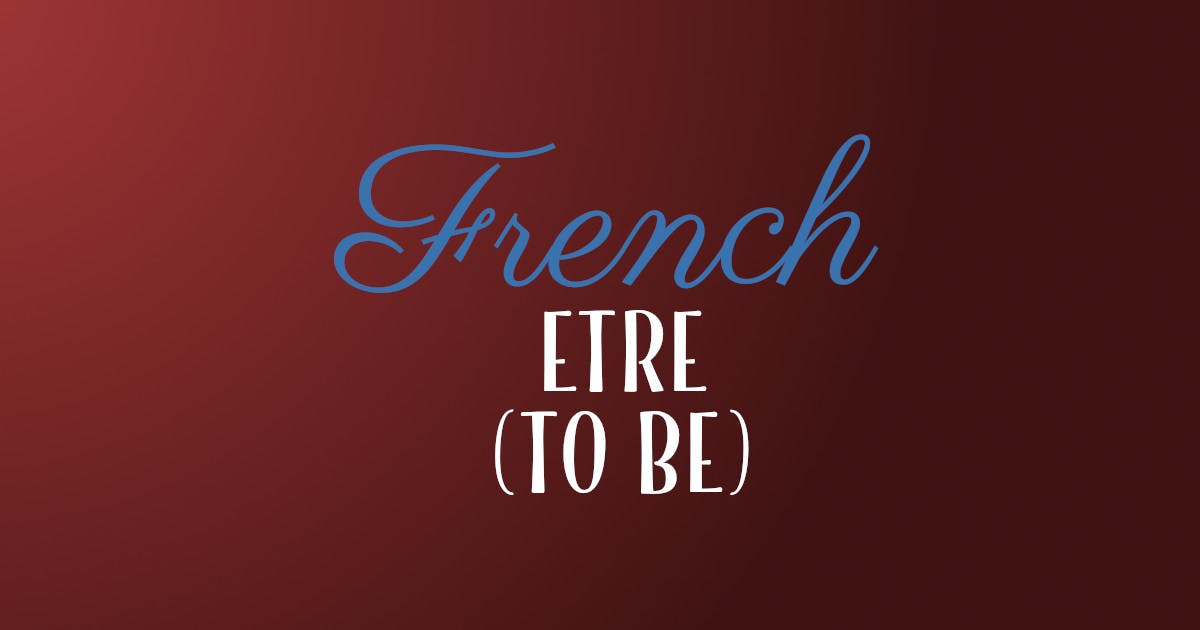How to Conjugate the French Verb Etre (To Be)
ÊTRE
“Être” is the French verb equivalent of “to be” and is just as important to French as the latter is to English. Besides being a verb in its own right, it is one of two French helper verbs, the other being avoir. It is used to build compound tenses. Once you've mastered être and the participe passé of the verbs to be conjugated, you've mastered the compound tenses.
Être is the model of its conjugation. This conjugation is irregular in that both the root and the tense endings can vary with the person and the tense. This is made clear in the present tense where the root goes from s- to e-, back to s- then e- and ends with s- again.
INDICATIF: The auxiliary verb is in blue, the tense endings in red.
Indicatif
| Présent | Imparfait | |
|---|---|---|
| je / j' tu il, elle, on nous vous ils, elles | suis es est sommes êtes sont | étais étais était étions étiez étaient |
| Passé Simple | Futur Simple | |
|---|---|---|
| je / j' tu il, elle, on nous vous ils, elles | fus fus fut fûmes fûtes furent | serai seras sera serons serez seront |
Compound tenses
| Passé Composé | Plus que Parfait | |
|---|---|---|
| j' tu il, elle, on nous vous ils, elles | ai été as été a été avons été avez été ont été | avais été avais été avait été avions été aviez été avaient été |
| Passé Antérieur | Futur Antérieur | |
|---|---|---|
| j' tu il, elle, on nous vous ils, elles | eus été eus été eut été eûmes été eûtes été eurent été | aurai été auras été aura été aurons été aurez été auront été |
Subjunctive
| Présent | Imparfait | |
|---|---|---|
| que j' que tu qu'il, elle, on que nous que vous qu'ils, elles | sois sois soit soyons soyez soient | fusse fusses fût fussions fussiez fussent |
| Passé | Plus que Parfait | |
|---|---|---|
| que j' que tu qu'il, elle, on que nous que vous qu'ils, elles | aie été aies été ait été ayons été ayez été aient été | eusse été eusses été eût été eussions été eussiez été eussent été |
Conditionnel
| Présent | Passé | Passé 2nd form | |
|---|---|---|---|
| j' tu il, elle, on nous vous ils, elles | serais serais serait serions seriez seraient | aurais été aurais été aurait été aurions été auriez été auraient été | eusse été eusses été eût été eussions été eussiez été eussent été |
Impératif
| Présent | Passé | |
|---|---|---|
| (tu) (nous) (vous) | sois! - soyons! soyez! | aie été! - ayons été! ayez été! |
infinitif**: être
participe présent: étant
participe passé:** été
Examples:
Indicatif
Présent: Il est en retard. / He is late.
Imparfait: Nous étions sur le point de partir. / We were about to leave.
Passé Simple: Tu fus heureux jadis. / You were happy once.
Futur Simple: Je serai le premier à te le dire. / I will be the first to tell you.
Passé composé: Elle a été polie avec ses beaux-parents. / She was polite with her in-laws.
Plus-que-parfait: Ils avaient été la fierté de leur club de football. / They had been the pride of their soccer club.
Passé antérieur: Nous eûmes été dans notre droit de lui avoir répondu. / We would have been within our rights to have answered him.
Futur antérieur: Tu auras été le plus grand acteur de ta generation. / You will have been the greatest actor of your generation.
Subjonctif
Présent: Quoi qu'il en soit, je ne vous crois pas. / Whatever the case may be, I do not believe you.
Imparfait: Bien que vous fussiez riche, vous n'étiez pas de bonne compagnie. / Although you may have been rich, you were not good company.
Passé: Il faut que j'aie été bien naïf pour croire vos mensonges. / I must have been really naïve to believe your lies.
Plus-que-parfait: J'eusse été bien avisé de vous avoir écouté. / I would have been well advised to have listened to you.
Conditionnel
Présent: Si nous avions la bonne carte, nous ne serions pas ici. / If we had the right map, we would not be here.
Passé: On aurait été contraint de payer une amende. / We would have been forced to pay a fine.
Impératif
Présent: Soyons calme! / Let us be calm!
Passé: grammatically possible but exceedingly rare for this verb
Infinitif
Présent: Être ou ne pas être, telle est la question. / To be or not to be that is the question.
Passé: Avoir été capitaine a été très gratifiant. / To have been captain has been very rewarding.
Participe
Présent: Étant bilingue, je comprends le français et l'anglais. / Being bilingual, I understand French and English.
Passé: Ayant été rapidement inoculé, j'ai survécu au poison. / Having been inoculated quickly, I survived the poison.
Gérondif
Présent: En étant docteur, on bénéficie de beaucoup d'avantages. / By being a doctor, one benefits from a lot of advantages.
Passé: En ayant été maire, elle a eu l'expérience du pouvoir. / By having been mayor, she has had the experience of power.

SUBSCRIBE: